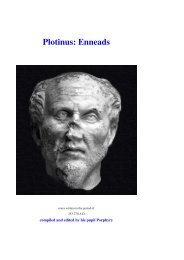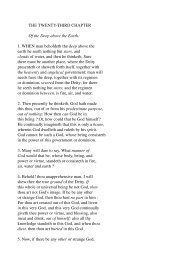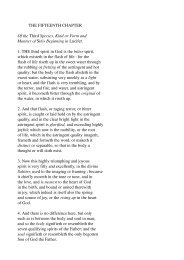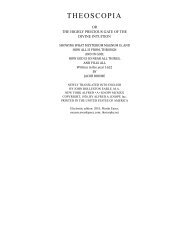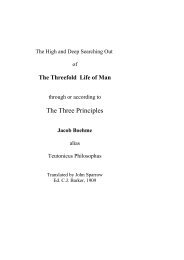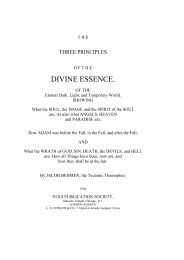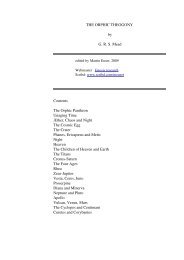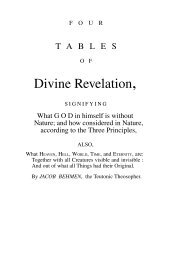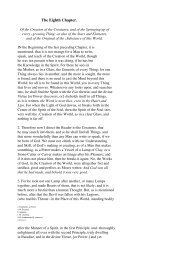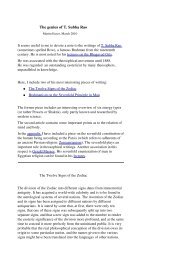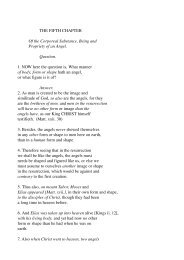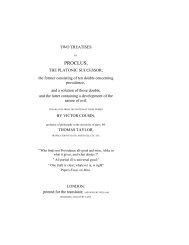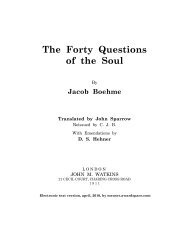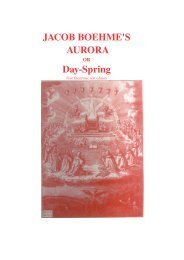Gerald Massey's Lectures - Society in evolution - Awardspace
Gerald Massey's Lectures - Society in evolution - Awardspace
Gerald Massey's Lectures - Society in evolution - Awardspace
Create successful ePaper yourself
Turn your PDF publications into a flip-book with our unique Google optimized e-Paper software.
and attributes of Apollo and Taht (or the lunar Horus) can be referred, and by which the<br />
characters may be satisfactorily expla<strong>in</strong>ed. The relationships of Apollo to Zeus, are<br />
exactly like those of Taht to Osiris, the supreme be<strong>in</strong>g. It is Taht who gives the Ma-<br />
Kheru, or Word of Truth, to the sun-god himself. As representative of Ra, his lunar logos,<br />
his light <strong>in</strong> the darkness, he is the Word whose promise is fulfilled and made truth by the<br />
Supreme Be<strong>in</strong>g, the sun that vivifies and verifies for ever. By his Word, he drives the<br />
enemies from the solar horizon, the <strong>in</strong>surgent powers of darkness which are fight<strong>in</strong>g<br />
eternally aga<strong>in</strong>st Ra. This is the character of Apollo as the defender of heaven aga<strong>in</strong>st<br />
every assault. These powers of darkness, cont<strong>in</strong>ually <strong>in</strong> revolt, ever warr<strong>in</strong>g with the sun,<br />
were called the giants which Taht-Khunsu, the giant-killer, slays by night, or dur<strong>in</strong>g the<br />
lunar eclipse. Apollo also figures as the destroyer of the giants who were at war with<br />
heaven. It is said <strong>in</strong> the Egyptian texts that Ra created this god, Taht, as "a beautiful light<br />
to show the name of his evil enemy," i.e., Sut-Typhon, the eternal enemy of the sun. He<br />
held up the lamp by night that made the darkness visible; showed the name, the face, the<br />
personal presence, of his lurk<strong>in</strong>g foe. This also is a character of Apollo, as a<br />
representative and k<strong>in</strong>d of deputy providence for Zeus.<br />
Apollo is god of the bow! Taht carries the bow of the crescent moon upon his head! Now<br />
the hero <strong>in</strong> the folk-tales who is always successful <strong>in</strong> draw<strong>in</strong>g the great bow <strong>in</strong> the trial<br />
where all his competitors fail, is this god of the new moon, who alone can bend the bow,<br />
or br<strong>in</strong>g the orb to the full circle of light once more. He can be identified <strong>in</strong> the H<strong>in</strong>du<br />
form of the Mythos as Krishna "with the Bow of Hari." The crescent on the head of Taht<br />
is the bow prepared and ready to be drawn to the full aga<strong>in</strong>st the power of night, and<br />
every form of evil that dwells <strong>in</strong> the darkness. Thus the lunar representative of Ra, with<br />
the bow of the young moon on his head, who prepares it month after month, and draws it<br />
to the full circle night after night, may be called the preparer of bows; and <strong>in</strong> Egyptian the<br />
name Apuru signifies a preparer of bows; it also means the Guide and Herald. As the u <strong>in</strong><br />
Egyptian stands for o, and r for l, we have Apuru=Apollo; the preparer of bows=the god<br />
of the bow as male div<strong>in</strong>ity of the moon, who was the offspr<strong>in</strong>g of the sun and moon, the<br />
bowman of the solar god. Mr. Gladstone doubts whether the root of Apollo is Greek, and<br />
says he would not be surprised to f<strong>in</strong>d it Eastern. All the evidence tends to prove it<br />
Egyptian by nature and by name. Apollo is the god of knowledge, past, present, and to<br />
come; Taht is the deity of knowledge, past, present, and future--the founder of science,<br />
lord of the div<strong>in</strong>e words, and secretary of the gods. Apollo is the god of poetry and music.<br />
So was Taht. He is the psalmist and s<strong>in</strong>ger; he is fabled to have torn out the s<strong>in</strong>ews of<br />
Sut-Typhon to form the lyre--the lyre or harp with seven str<strong>in</strong>gs be<strong>in</strong>g an image of the<br />
new moon, like the bow.<br />
Apollo was the god of heal<strong>in</strong>g. Taht is the supreme physician and healer; "He who is the<br />
good Saviour," as it is written on a statue <strong>in</strong> the Leyden Museum. Apollo was the br<strong>in</strong>ger<br />
of death <strong>in</strong> a form that was serene and beautiful, as became the lunar Lord of light, and<br />
enlarger of the lunar light to the full,--the character and function be<strong>in</strong>g afterwards applied<br />
to the light of life that suffered the pass<strong>in</strong>g eclipse of death. One name of Taht is Tekh,<br />
which signifies to be full!<br />
Of course the Greeks did not simply take over the Egyptian mythology <strong>in</strong>tact, nor did<br />
they preserve the descent quite pure on any s<strong>in</strong>gle l<strong>in</strong>e. In re-apply<strong>in</strong>g the legendary lore,<br />
derived from Egypt, to the same phenomena <strong>in</strong> nature, there would be considerable<br />
mixture, amalgamation, change of name, and consequent confusion. The bl<strong>in</strong>d Horus of<br />
Egypt reappears as the bl<strong>in</strong>d Orion <strong>in</strong> the Greek mythos. This is as certa<strong>in</strong> as that the<br />
constellation of Orion, the star of Horus, was named Orion after Horus! His lunar<br />
relationship is shown by the recovery of his sight on expos<strong>in</strong>g his eyeballs to the rays of<br />
the ris<strong>in</strong>g sun,--just as the eye of Horus was restored to him through the return of light at<br />
dawn. Horus <strong>in</strong> his lunar character is one with Taht and Khunsu <strong>in</strong> the other cults; that is,<br />
the lunar child may be Horus as son of Osiris, or Taht as the offspr<strong>in</strong>g of Ra, or Khunsu



